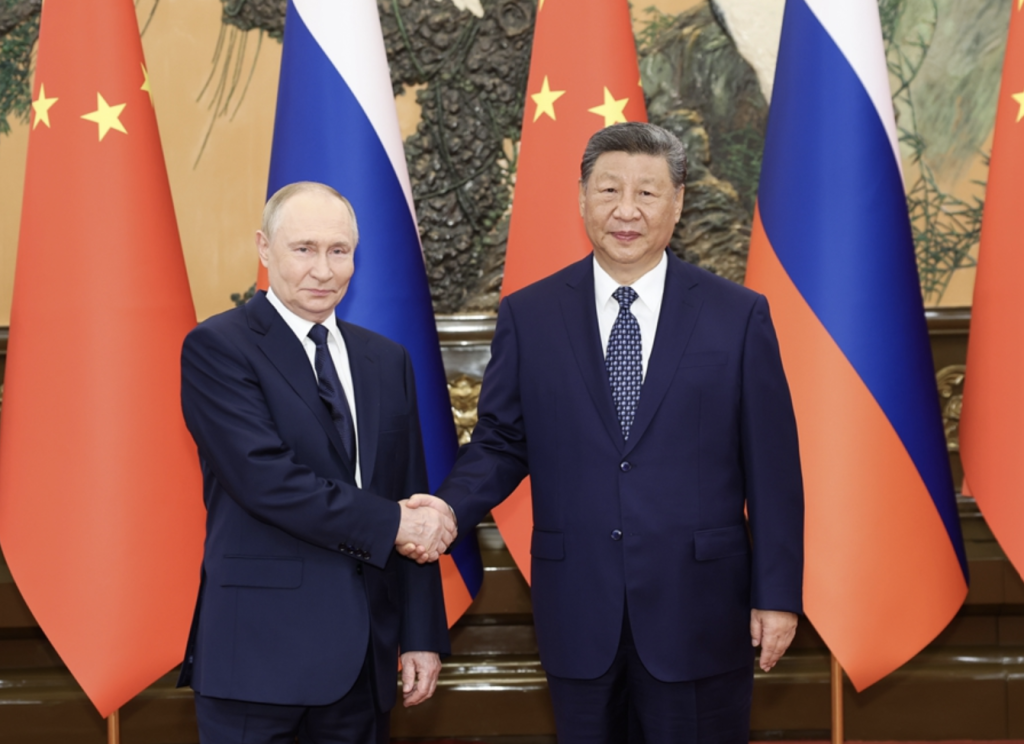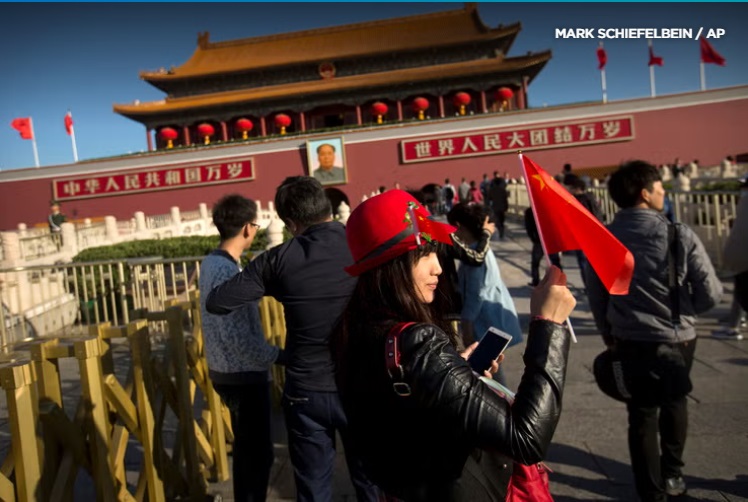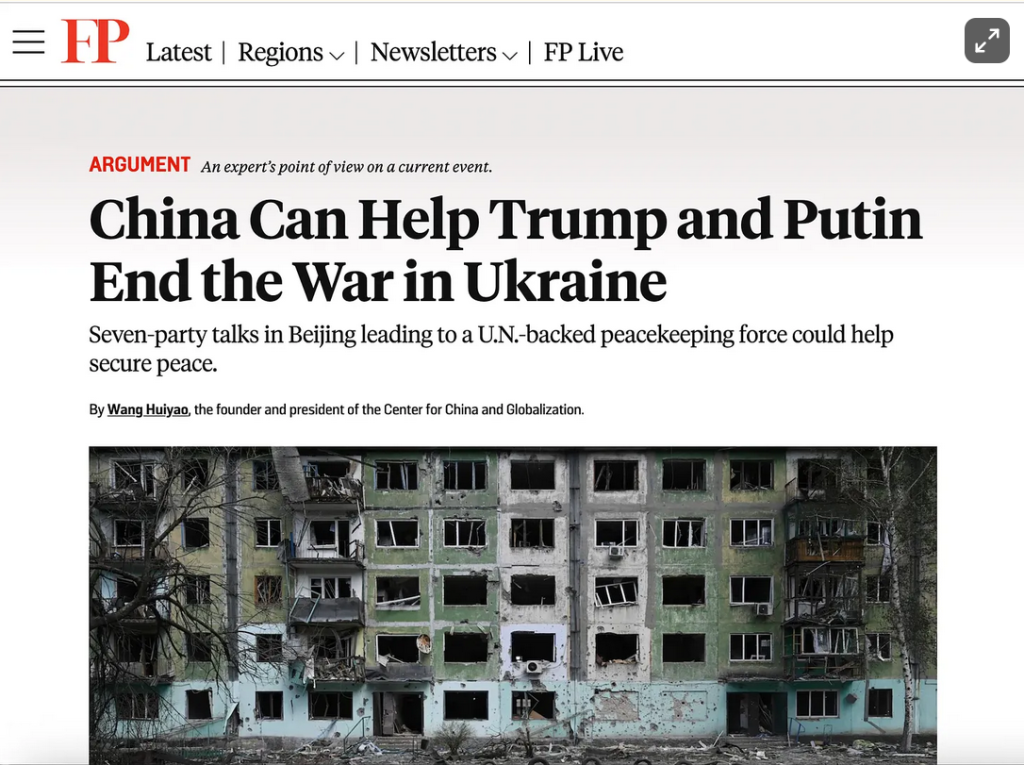A War China Didn’t Fight but Still Lost: Beijing’s Strategic Setback after Ukraine
- Analysis
 Xin Sichao
Xin Sichao- 10/23/2025
- 0

On September 2, China’s President Xi Jinping held talks with Russian President Vladimir Putin at the Great Hall of the People in Beijing. Source.
The Russia–Ukraine conflict is the most significant historical event of the 21st century. This war has redrawn the global map and reshaped the international order, bringing the world back to an era of confrontation between East and West reminiscent of the Cold War. As the biggest beneficiary of the post–Cold War era—marked by the dissolution of the Soviet Union, détente between China and the West, and the wave of globalization—China has now been pulled into this confrontation and turned once again into an adversary of Western countries. In this sense, China has become one of the major losers of the Russia–Ukraine war.
Taking advantage of the end of the Cold War and the opportunities created by globalization, China improved its relations with developed Western nations and fully utilized global resources to achieve rapid growth. Within just a decade, it became the world’s factory, and its momentum toward national rejuvenation was unprecedented. The country appeared to be only one step away from escaping the middle-income trap and joining the ranks of developed nations. However, after the outbreak of the Russia–Ukraine war, China became closely linked to Russia and was passively drawn into opposition with the West. Its cooperation with developed countries was disrupted, halting its march toward the center of the global stage. Economic growth slowed, the GDP gap with the United States widened, and the dream of national rejuvenation has become increasingly remote.
Since the war broke out on February 24, 2022, more than three years have passed. Contrary to President Vladimir Putin’s expectations of a swift victory, the conflict has turned into a protracted war of attrition. Russia is mired in a quagmire, its national strength systematically weakened. Under joint sanctions and containment by Europe and the United States, Russia has become isolated from the international community. Its future is precarious, with even the risk of eventual disintegration.
The combined effects of Western economic sanctions and military aid to Ukraine have severely damaged Russia’s military capabilities, as the Ukrainian battlefield continues to drain its resources. Putin initially sought to achieve a rapid victory similar to his annexation of Crimea, but instead, he found himself trapped in a drawn-out conflict that Russia can least afford. Its defense industry has been nearly paralyzed under sanctions, and even the production of basic ammunition now depends on imported components from China and Iran, resulting in extremely low efficiency.
By 2025, Russia’s economic losses have exceeded one trillion U.S. dollars, with military casualties approaching one million. Its elite forces and advanced weaponry have suffered enormous losses. The war has exposed chaos in command, weak logistics, and poor information warfare capabilities. The myth of Russia as the “world’s second military power” has completely collapsed on the plains of Eastern Europe. As a result, Russia may face long-term decline or even the risk of disintegration due to the Ukraine war.
The United States, by contrast, is undoubtedly the biggest beneficiary. Without deploying a single soldier, it has systematically weakened Russia through Ukraine, reshaped the European security order, and encouraged European countries to increase defense spending and rearm—thereby reducing America’s military burden. At the same time, it has gained enormous economic benefits by selling both energy and weapons to Europe. Between 2022 and 2023, U.S. energy exports to Europe multiplied several times, with prices far exceeding the historical levels of Russian gas, sending profits of American energy companies soaring. Meanwhile, defense giants such as Lockheed Martin and Raytheon saw a surge in orders and stock prices, turning war into their most efficient engine of profit.
Through the Ukraine battlefield, the United States has managed to contain Russia globally at minimal cost, while freeing up strategic resources to focus on the Asia-Pacific region. Even after Donald Trump returned to the White House in 2024, U.S. policy toward Ukraine has not fundamentally changed. Although he publicly called for negotiations and tried to pressure allies through tariffs, military aid has continued. This indicates that weakening Russia, maintaining Western unity, and preserving the U.S.-led unipolar order remain a deep bipartisan consensus in Washington. Consequently, America’s global dominance has become even more firmly entrenched.
At the same time, although European countries have faced significant security risks and paid a certain economic price because of the Russia–Ukraine war, the conflict has also triggered Europe’s awakening and accelerated its military resurgence. The outbreak of war forced Europe to end its dependence on Russian energy, reducing and eventually halting purchases of Russian oil and gas. Contrary to Moscow’s expectations, Europe did not collapse under the energy shock; instead, it accelerated its transition toward a diversified and sustainable energy structure. Russia’s “energy weapon” has been completely neutralized, dismantling the geopolitical leverage Moscow had accumulated over European nations for decades.
NATO, far from being “brain-dead” as French President Emmanuel Macron once described, has undergone a powerful revival. Finland and Sweden abandoned their long-held neutrality and formally joined the alliance, dramatically increasing strategic pressure on Russia’s northwestern borders. European countries have significantly raised their defense budgets—Germany has broken its post–World War II military taboos, while France, Poland, and the Baltic states have all expanded their armed forces.
This outcome was something Putin never anticipated. The very crisis he unleashed has prompted European nations to rearm and strengthen their defense capabilities, giving rise to a European military bloc that Russia cannot match. This has further enhanced the collective military strength of the Western world and advanced Europe’s quest for greater strategic autonomy.
China, due to its special relationship with Russia, has found itself in a position of strategic passivity. Although China is not directly involved in the war, it has suffered significant indirect losses in the economic, diplomatic, and security spheres. The conflict has left China trapped in a dilemma of unintended confrontation with the West.
Economically, the disruption of Black Sea grain exports pushed up global food prices. As a major food importer, China saw its import costs rise sharply between 2022 and 2023. Crude oil prices have remained volatile at high levels due to both the war and instability in the Middle East, squeezing the profit margins of Chinese manufacturers. Western sanctions on Russia have also made normal trade between China and Russia increasingly risky. Each transaction requires Chinese companies to assess the danger of secondary sanctions, cross-border payments have become more complex, and multiple investment projects have been forced to halt.
Meanwhile, trade and cooperation between China and Ukraine have virtually collapsed. Prewar partnerships in agriculture, infrastructure, and technology have been completely suspended. The war has also pushed European nations to prioritize economic security as a core national strategy, leading them to deliberately reduce imports from and cooperation with China. This double-edged situation has imposed hidden economic costs on China.
The strategic consequences are even more severe. The West now groups China within the “pro-Russia camp,” accelerating technological decoupling. Restrictions on semiconductors, artificial intelligence, and quantum computing have intensified. The U.S. decision to freeze over 300 billion dollars in Russian foreign reserves has also served as a warning that China’s own overseas financial assets face real risks.
The war has prompted the United States to strengthen its security network in the Asia-Pacific, significantly worsening China’s regional security environment. The Philippines, citing the need to “prevent conflict spillover,” has opened additional bases to U.S. forces. Japan’s defense budget reached 55.9 billion dollars in 2025, funding the purchase of Tomahawk cruise missiles and the conversion of its Izumo-class destroyers into F-35B carrier platforms. Taiwan, meanwhile, has signed 14 arms deals within two years, including Harpoon anti-ship missiles and loitering munitions.
The arms race in the Asia-Pacific has intensified. The U.S. stance on Taiwan has grown more assertive, with Washington even reassessing the possibility of direct military involvement. Diplomatically, China faces a difficult balancing act. Its abstentions in key United Nations votes have been interpreted by the West as tacit support for Moscow. Ukrainian President Volodymyr Zelensky publicly labeled China a “member of Russia’s criminal alliance”—an emotional statement, yet one that has fueled negative perceptions in international opinion.
China’s Belt and Road Initiative has also suffered a serious setback. Despite Beijing’s insistence on neutrality and nonalignment, its voting record at the United Nations has sparked doubts among some partner countries. Several nations now fear that getting too close to China could invite Western sanctions, hinder financing, and limit access to Western markets.
The Russia–Ukraine war has fundamentally transformed the global landscape. The era of globalization driven by efficiency is waning, replaced by a new order that prioritizes security, regionalization, and bloc-based competition. This shift is particularly unfavorable to China, as it is pushing the country back into a Cold War–style confrontation with the developed Western world.
In fact, the war has unwillingly and passively drawn China into alignment with Russia against the West. There is a real risk that China has been pulled onto Russia’s geopolitical “bandwagon.” As the conflict dragged on, the United States and Europe reduced trade with China, prompting Beijing to expand economic ties with Moscow in search of alternative markets. Sino-Russian trade has grown sharply—energy, grain, and industrial goods now flow more closely than ever. By 2025, bilateral trade reached a record high, with China becoming Russia’s largest trading partner, deepening their economic interdependence.
Under continuous Western pressure, China has been urged to cut support for Russia or face harsher sanctions. However, Beijing’s refusal to join Western sanctions has widened its economic rift with the developed world. At the same time, political and military ties between China and Russia have become increasingly close. Seeking China’s support, Putin has proactively strengthened bilateral cooperation, making frequent visits and high-level contacts. In turn, China has been passively drawn into closer alignment. In 2024, the two militaries conducted multiple joint exercises, with Russia sharing its battlefield experience against Western weapons. Joint air patrols by the Chinese and Russian air forces have become almost routine.
This close partnership has made it difficult for China to see Russia defeated in Ukraine. As a result, Beijing has often been perceived as passively supporting Moscow, prolonging the conflict. Yet the longer the war drags on, the greater the losses for both sides—and the tighter the China–Russia relationship becomes. This prolongs China’s estrangement from the West, making any future reconciliation more difficult and hindering China’s development.
The war has divided the world into two opposing camps: those supporting Russia’s military actions and those backing Ukraine’s defense of its sovereignty. Because of its partnership with Moscow, China has refrained from openly condemning Russia or participating in sanctions. Instead, it has significantly increased trade with Russia. Western nations interpret this as a sign of Beijing’s support for Moscow, viewing China as the largest source of indirect assistance to Russia—and, consequently, as the greatest long-term threat to Western security.
As a result, China’s relations with Western countries have plunged to their lowest point in decades. Western governments have reduced economic cooperation with China, tightened technological restrictions, and imposed new export controls. These measures have sharply slowed China’s economic growth.
China’s slowdown since 2022 is not coincidental. It coincides with the outbreak of the Russia–Ukraine war and the West’s coordinated efforts to reduce dependence on China’s supply chains while constraining its economy. Given that the global economy remains dominated by the developed Western powers, these policies have had a significant impact.
The economic balance between China and the United States has also shifted dramatically. Before 2022, China’s GDP had been steadily catching up with that of the U.S., with many forecasting that China would soon become the world’s largest economy. However, since the war began, this trend has reversed sharply. China’s GDP, which stood at about 76.4% of the U.S. level in 2021, fell to around 64.9% by 2024. It is now widely recognized that under the current international conditions, China’s chances of surpassing the United States have become remote.
In short, China’s long march toward becoming the world’s largest economy—its path to national rejuvenation—was interrupted by the outbreak of the Russia–Ukraine war. As some observers have put it, this marks a downturn in China’s “national fortune.”
The war has disrupted the globalized economic order that once fueled China’s rise. The favorable international environment that supported its development has been broken, halting its momentum toward rejuvenation. Only when the Russia–Ukraine war ends and the world returns to a more cooperative, globalized order can China hope to resume its trajectory of growth and revival.
However, this will require both time and good fortune. China must avoid being dragged into the conflict, resist being passively entangled in war, and maintain strategic composure. Above all, it must support efforts to bring the Russia–Ukraine war to an end as soon as possible.
This article was originally published in Chinese by Xin Sichao on Ziye Guancha.
Author
-

Xin Sichao is a prominent Chinese political commentator.



